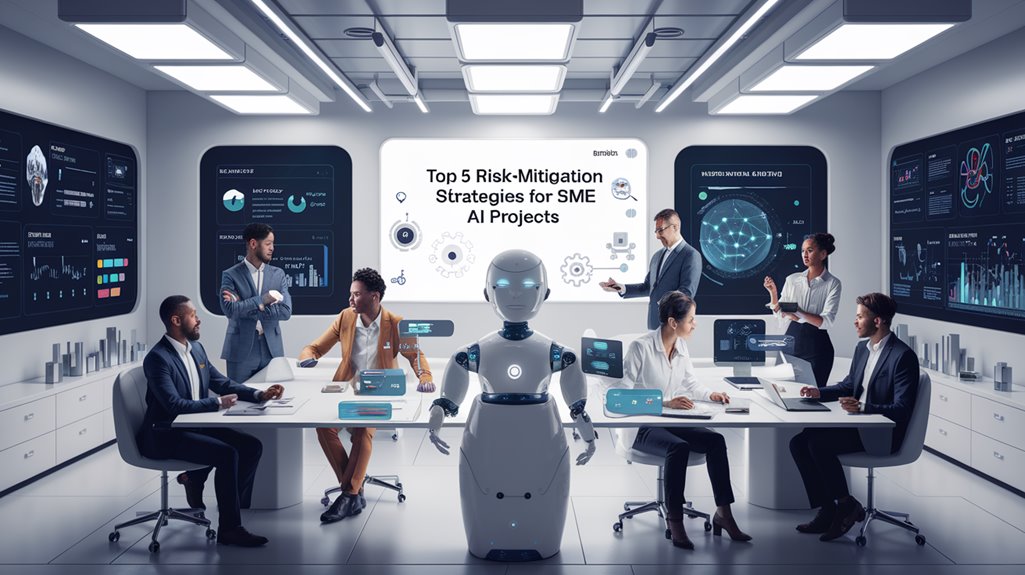Top 5 Risk-Mitigation Strategies for SME AI Projects
For successful AI projects in SMEs, you should start with a robust AI Risk Management Framework, addressing data, model, operational, and ethical risks. Protect sensitive data through encryption and access controls. Implement continuous monitoring to detect biases and guarantee compliance. Engage stakeholders for effective communication and align AI ethics with organizational values. Invest in AI-specific training to stay updated with evolving regulations. Leveraging these strategies can offer more insights into managing AI project complexities.
Establish a Comprehensive AI Risk Management Framework
Establishing a thorough AI risk management framework is essential for SMEs aiming to safeguard their AI projects against potential vulnerabilities.
Start by identifying risks within data, model, operational, and ethical/legal domains. Prioritize these risks according to stakeholder impact, using extensive risk assessment tools like risk matrices.
Implement ISO/IEC standards to emphasize transparency and ethical AI practices, thereby building trust. Regularly update and continuously monitor AI systems to guarantee alignment with regulatory compliance, such as the EU AI Act, and to mitigate operational risks like data drift.
Foster data governance and maintain cross-functional communication to enhance adaptability. By embedding these risk mitigation strategies, you’ll strategically manage AI vulnerabilities and guarantee your projects remain robust and ethically sound.
Prioritize Data Security and Privacy Measures
Although often overlooked, prioritizing data security and privacy is essential for SMEs undertaking AI projects. You must implement encryption and access controls to safeguard sensitive data, especially since 70% of consumers worry about AI usage.
Compliance with GDPR is non-negotiable; hefty fines and legal repercussions can devastate your business. Proactive measures, like regular data audits, are vital to maintaining data integrity, as 60% of small businesses fail within six months of a cyber attack.
Adopting a zero-trust security model further strengthens your defenses by requiring strict identity verification for every access attempt. With data breaches averaging $3.86 million per incident, prioritizing these privacy measures not only protects your assets but also guarantees your AI project’s success.
Implement Continuous Monitoring and Evaluation
When implementing AI projects, continuous monitoring and evaluation become indispensable tools for managing risk and guaranteeing compliance with regulations like GDPR and the EU AI Act.
By integrating automated oversight, you can detect biases and inaccuracies in real-time, promoting high-quality decision-making. Regularly updating risk metrics aligns project outcomes with stakeholder expectations, reducing reputational risks.
Feedback loops enable iterative assessments, allowing for timely adjustments in AI strategies based on performance and ethical considerations. Proactive risk management is bolstered by ongoing employee training, fostering a culture of accountability.
This empowers your team to identify emerging risks effectively and maintain compliance with evolving legal frameworks. With these practices, you’ll enhance trust and guarantee your AI initiatives remain robust and ethically sound.
Foster Stakeholder Collaboration and Communication
To effectively manage AI risks in SME projects, fostering stakeholder collaboration and communication plays a crucial role. By engaging diverse perspectives, you enhance risk management through thorough identification and assessment of AI risks.
Regular communication among stakeholders such as project managers, technical teams, and legal advisors guarantees alignment on objectives, promoting proactive risk identification and management throughout the project lifecycle.
Engage stakeholders in developing AI ethics guidelines to build trust, addressing ethical concerns and reducing ambivalence.
Cross-functional committees enable ongoing monitoring and iterative improvements, essential for adapting to evolving AI technologies.
Establish clear roles, responsibilities, and communication channels to enhance monitoring and response capabilities, minimizing mismanagement risks and project delays.
This strategic approach strengthens your project’s resilience against potential AI challenges.
Invest in AI-Specific Training and Education
Building on the foundation of robust stakeholder collaboration, investing in AI-specific training and education is a strategic imperative for SMEs aiming to manage AI risks effectively.
By investing in AI-specific training, you equip employees with essential skills to understand AI technologies, enhancing their confidence and ability to identify and mitigate risks. A thorough training program not only bridges skill gaps but also empowers staff to recognize ethical dilemmas, promoting responsible AI usage.
Regular training guarantees your team stays informed on evolving regulatory requirements, reducing compliance risks and bolstering operational stability. According to McKinsey, organizations prioritizing AI education experience a 30% boost in employee confidence.
Consequently, investing in tailored AI training is crucial for maneuvering the complexities of AI technologies successfully.
Conclusion
By adopting a thorough AI risk management framework, prioritizing data security, implementing continuous monitoring, fostering stakeholder collaboration, and investing in AI-specific training, you’ll effectively mitigate risks in your SME AI projects. These strategies not only safeguard your investments but also enhance operational efficiency and stakeholder trust. Embrace proactive risk management to guarantee your AI initiatives thrive in a competitive landscape, positioning your business for sustainable growth and innovation in the ever-evolving world of artificial intelligence.
